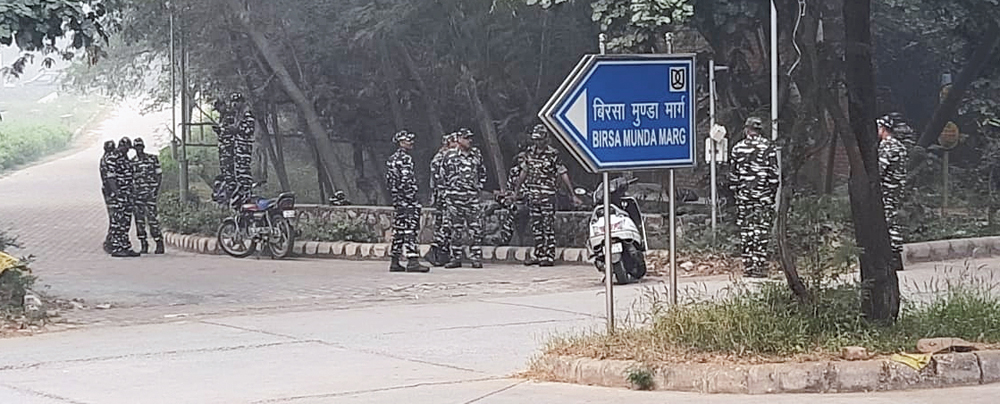Jawaharlal Nehru University on Monday woke up to camouflage-clad men on campus, a sight that none could recall in 36 years.
A company of more than 120 Central Reserve Police Force (CRPF) personnel, and as many from Delhi police, guarded the varsity’s three gates, and vice-chancellor M. Jagadesh Kumar’s bungalow before a protest march by the JNU Students’ Union (JNUSU) against a 30-fold hike in the rent to be paid by students for hostel rooms.
In July 1975, after the Emergency was declared, the CRPF had aided Delhi police in raiding the campus to nab anti-government activists among students, teachers and employees.
The next time the CRPF visited was in 1983 when it patrolled the campus following a lathi-charge that ended a gherao of the vice-chancellor — again over a hostel related issue — and Abhijit Vinayak Banerjee, the future Nobel laureate, was among those arrested.
During the crackdown on alleged seditious sloganeering in 2016, Delhi police alone had arrested then JNUSU president Kanhaiya Kumar. In the protests and gheraos that followed, no uniformed police personnel was seen.
On Monday, JNUSU vice-president Saket Moon told The Telegraph: “From around 8.30am, students and teachers started posting on social media that the CRPF is on campus. I went to the East Gate, where a police bus was parked to find out why they are here. When asked, an assistant sub-inspector of the CRPF said it is for Odd-Even (the transport scheme), which was funny because paramilitary troops are not deployed to manage traffic, that too on campus. I asked him why the VC’s house was barricaded and he had no answer.”
Students have been on strike for most of last week, and have locked the office of a dean, after the Inter Hall Administration (IHA) approved a new hostel manual in a meeting in which the JNUSU was kept out of.
The administration is yet to recognise the newly elected JNUSU, which is led by Left groups. The varsity had warned students of “severe action” last week after they protested outside the health centre where dean of students Umesh Kadam was brought by an ambulance after students protested outside the IHA meeting that cleared the rent hike. Protests outside wardens home have also taken place over the last week.
VC Kumar and other officials did not respond to questions about the CRPF on the campus.
A statement from the VC said: “The provosts have invited the hostel presidents for a meeting on 6th November. We request the hostel presidents to meet their provosts along with the wardens and discuss their issues. We appeal to the students to resume their academic activities. Issues can be resolved through dialogue with the officials of Inter Hall Administration.”
The JNUSU estimates that 40 per cent of students will not be able to afford hostels as new total annual charges — which include rent, mess fees and fresh charges of utilities and services — could be more than Rs 60,000, which is higher than the non-NET scholarship for MPhil students. Current total charges are around half this amount.
The new hostel manual prescribes entry and exit timings, and a dress code — both have never been enforced till now.
After a large public gathering at the administration building, students marched to Vasant Kunj North police station to file missing persons complaints to find VC Kumar. Moon said: “We were told at the Administrative Building that the VC has gone to meet the DCP. For a whole week now, we have protested these illegal changes aimed at privatization of the education, and moral policing.”
The police and the CRPF initially stopped the students at the West Gate, yet allowed them to proceed to the police station where they submitted more than 200 complaints.
Asked about the CRPF, DCP (South West) Devender Arya told this newspaper: “There is no development related to the police in JNU.”
CRPF spokesperson Moses Dhinakaran said that the CRPF provides around 50 companies to the Delhi police to assist them. “Delhi police decide where they are deployed for security,” he added.
International Relations professor and member of JNU’s executive council Moushumi Basu said that bringing paramilitary troops on the campus showed that the administration had “failed”.
Basu said: “First, new security guards who are ex-servicemen are hired at a much higher amount that before. Then they start complaining that their salaries aren’t being paid on time. Then the police and the CRPF are brought in after students start complaining of this huge hike and the new rule book was declared without consulting elected office bearers. VCs of central universities like Visva-Bharati and Banaras Hindu University have asked for the Central Industrial Security Force, and JNU brings in the CRPF. It shows that they are failed administrators.”











